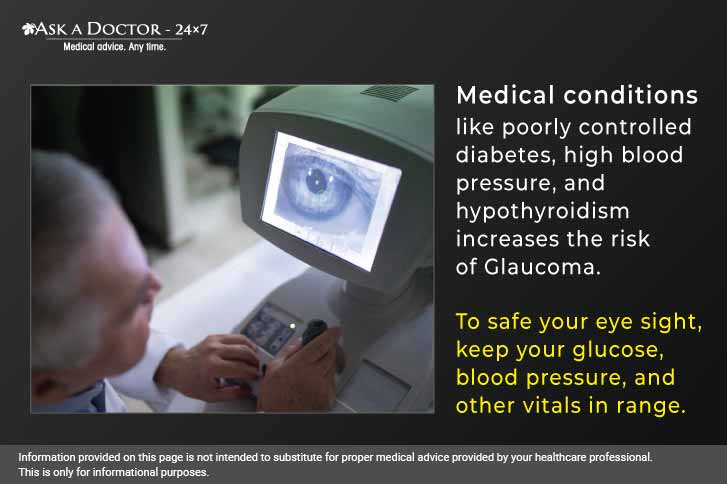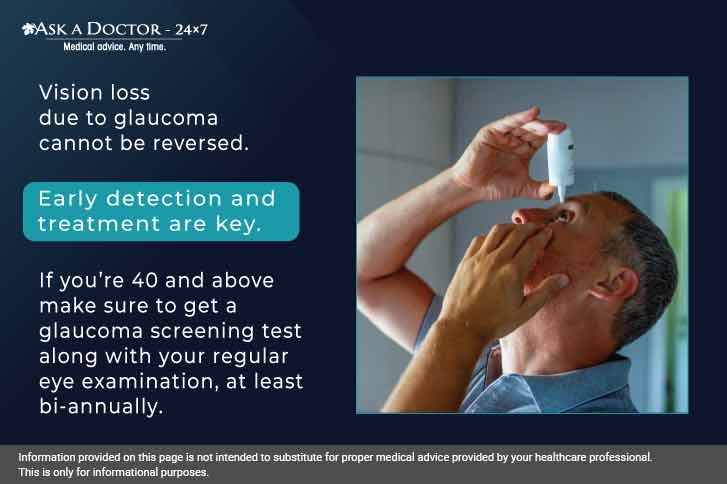All You Need To Know About Glaucoma
Glaucoma is an eye condition that damages the nerve connecting the eye to the brain called optic nerve. Imagine an optic nerve like a data cable that emerges from the back of your eyes and carries visual signals to your brain. When this optic nerve is damaged by glaucoma, the flow of visual information is disrupted. Damage to the optic nerve causes vision loss and eventually permanent blindness.
Glaucoma is known as a ‘silent disease’, as its symptoms do not show up until a person notices vision changes and irreversible damage to eyesight has already been done. Most people are unaware of the disease until they are at risk of permanent vision loss. Let us read to know all about glaucoma in detail.
Risk Factors That Can Cause Glaucoma

The factors that can contribute to glaucoma risk are:
- Family history: Glaucoma such as open-angle glaucoma is an inherited condition. You are at a considerably higher risk of developing glaucoma than the general population if close members of your family have the disease.
- Age: You are more likely to get glaucoma as you age (over age 60), but it can affect anyone at any age, including babies.
- Race: It is found that Africans, Asian, African Americans and those from Hispanic heritage are more likely to get disease.
- Intraocular Pressure or high internal eye pressure: If there is high fluid pressure inside the eyes, the risk of optic nerve damage increases.
- Certain medical conditions: People dealing with diabetes, migraines, high blood pressure, and sickle cell anemia are found to be at a higher risk of developing glaucoma.
Besides all the above factors, long-term use of corticosteroid drops can also increase the risk glaucoma.
Symptoms of the Onset of Glaucoma
People with glaucoma usually do not experience symptoms until they start to lose their vision. Get medical care right away, if you have any of these symptoms:
- Observing haloes or 'rainbows' around lights
- Small blind spots on the side
- Sensitivity to light
- Blurred or narrowed field of vision
- Redness in the eye
- Headache or vomiting
- Eye pain and discomfort
Tests to Diagnose and Monitor Glaucoma
A comprehensive eye examination including five common tests are done to detect glaucoma. These tests include:
- Tonometry: It is done to analyze the inner eye pressure, also know as intraocular pressure.
- Ophthalmoscopy (dilated eye exam): This test helps to detect the shape and color of the optic nerve for glaucoma damage
- Perimetry (visual field test): It helps to check for missing areas of vision. Patients are shown a sequence of light spots and asked to press a button as they see the spot to indicate complete vision field.
- Gonioscopy: helps determine whether the angle where the iris meets the cornea is open and wide or narrow and closed
- Pachymetry: It is a painless test, done through a probe called a pachymeter, to measure the thickness of your cornea — the white part of the eye.
Treatment for Glaucoma

Glaucoma cannot be cured but it can be managed through medical early intervention, which comprises of:
- Medications (Eye Drops): To help reduce the pressure inside the eye by producing less fluid or by helping fluid drain from the eye.
- Surgery: To create a new aperture for fluid to exit the eye. This can be accomplished by constructing a drainage pathway or by inserting a shunt to aid in fluid drainage.
- Laser surgery: Glaucoma is treated by various laser-assisted surgical procedures.
- Lifestyle changes: Lower your sugar intake as a high-sugar diet elevates glaucoma risk. Also, regular exercise reduces risk by keeping insulin levels and blood pressure regulated. Eat healthy and don’t smoke.
Glaucoma is the second leading cause of permanent blindness, worldwide. It is caused by the damage to the optic nerve. Currently, there is no cure for glaucoma, but vision loss can be slowed or stopped if the disease is diagnosed and treated early. An eye doctor will be able to identify glaucoma symptoms before you can, and prompt treatment is essential to halting the disease's development and visual loss. Treatment involves medications and/or surgery directed at lowering eye pressure.
If you have any questions about your eye problem or notice any new symptoms of glaucoma or other eye disorders, you can check with our Ophthalmologists at Ask a doctor, 24x7.
Recently Answered Questions Related to Glaucoma and Eye Health
- Need Suggestions On Natural Medicines For Glaucoma
- Is Timolol Right Medication For Glaucoma?
- How Can Glaucoma Be Treated?
- What Is The Difference Between Tropan And Trofame?
- Suggest Treatment For Glaucoma And Blindness
- Having Headaches And Sensitivity To Light. Suggest Treatment
- What Is Pattern Blindness?
- Congenital Squint, Cataract. Intraocular Lens Implanted, Glaucoma Developed. Surgery Done, Permanent Blindness. Eye Replacement Possible?
- Can Diabetes Cause Blindness?
Disclaimer: Information provided on this page is not intended to substitute for proper medical advice provided by your healthcare professional. This is only for informational purposes.
Ask a Specialist
Recent Questions


